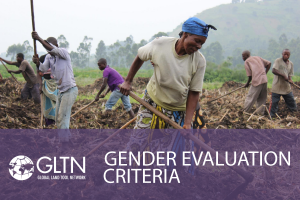Online Discussion: Sharing Best Practices and Lessons Learned for Supporting Women’s Land Rights: A Debate on the Gender Evaluation Criteria (GEC)
Wikigender is co-hosting this online discussion, which is organised by the Land Portal Foundation. The discussion on “The Gender Evaluation Criteria (GEC): Achieving Women’s Land Rights by Any Means Necessary” will be open from 25 January to 5 February.
About
Since 2007, the Global Land Tool Network (GLTN) partners have been working on the development, piloting, training of trainers and dissemination of the Gender Evaluation Criteria among a wide range of stakeholders at global and country level. The GLTN Secretariat worked in particular with the Huairou Commission (HC), the International Federation of Surveyors (FIG), and the University of East London (UEL) to develop the GEC as one of the flagship land tools to check whether land tools are gender responsive, and to show how they can be adapted to integrate various dimensions of gender issues. They are a flexible framework comprised of 6 criteria and 22 evaluation questions with possible indicators that can be adapted to a wide range of different situations.
Several grassroots women’s organizations, members of the Huairou Commission, tested the GEC during in its initial phase in Brazil (Espaço Feminista), Ghana (Grassroots Sisterhood Foundation) and Nepal (Lumanti). These tests focused on large-scale land tools: municipal master plans, land reform commissions and land administration systems. In the case of Brazil, the application of the tool ensures inclusivity in the design, implementation and evaluation of programs. A number of community leaders working on land and property rights, researchers, land professionals and representatives of the government’s land institutions have been trained in designing and evaluating land tools with a gender analysis to realize and to recognize inequity and/ or inclusion issues in land policies and land regulations, and to develop mitigation and affirmative action approaches where necessary. Furthermore, the Uganda Land Alliance implemented the second phase of pilots aggregating the capacity development of 10 districts, rural and urban, across Uganda. The ILC has primarily facilitated capacity-strengthening on the use of the Gender Evaluation Criteria (GEC) since 2012 through a series of Training of Trainers. The International Land Coalition (ILC) has also supported its members in Africa, Asia and Latin America to use the use the GEC tool for a variety of purposes, with members in Togo, Zimbabwe, and Indonesia carrying out GEC evaluations as part of their country-level work.
Clearly, the usefulness of the GEC has been demonstrated as a method of data collection, managing knowledge, producing tangible and rigorous evaluations and engaging with multiple stakeholders to discuss and validate evidence-based information. The GEC has become a mature tool that has been embraced by grassroots groups to step up and progress in their decision making processes. While it is designed for use by many land stakeholders, there is still a need to engage better with more governments and professional groups to champion the use of the GEC in various contexts. In the range of country experiences, the GEC has shown breadth and versatility in both rural and urban sectors. However, the GEC needs improvement in terms of further simplifying the tool for wider adoption by grassroots organizations.
Objectives of the discussion
In this regard, the specific objectives of the discussion are:
- Gathering lessons and best practices on the usage of the GEC.
- Identifying the positive and negative aspects, the challenges faces and positive outcomes of tools like GEC.
- Identifying entry points for the adaptation and revision of the tool for up-scaling
- Comparing this tool to similar gender tools used by other communities.
- Addressing the main characteristics of a tool aimed at promoting women’s land rights.
- Bringing together stakeholders in the land governance community and creating possibilities for synergy.
Questions for discussion
We invite the Wikigender community to answer one or more of the following questions:
- Why did you decide to use GEC to promote women’s land rights in your community? Was it successful and why? What challenges did you face in using this tool? What were the positive and negative outcomes? Please share a personal story of your experiences
And:
- What other tools have you used to promote women’s land rights? What were the positive and negative outcomes of these tools? Have you combined different tools in the same project or activity? If so please share a story about this experience.
- If you have used GEC and other tools to promote women’s land rights could you make a comparison between these different tools in terms of replicability, effectiveness, and issues that you can tackle using the different tools and different results and challenges?
- How can we bring women’s land rights to the next level? What is the role of evaluation tools in doing this?
- If you have not used the GEC before, based on the experiences shared through this online discussion, do you think your activities would benefit of its use? If so how? Would you be interested in learning more about GEC and other tools to promote WLRs?
- If you are aware of other effective tools to promote women’s land rights that have not been mentioned in this discussion (and you used them) please share your experience.
How can I participate?
You can type your comment below and answer one or more of the suggested questions in English, French, or Spanish. If you have any questions feel free to contact the Land Portal Foundation at hello@landportal.info
The discussion is being held simultaneously on the Land Portal and in partnership with the FSN-Forum.
The discussion will be facilitated by the International Land Coalition’s gender team.
Results of the discussion will be analyzed and transformed into a report that will be distributed widely among land governance stakeholders.



